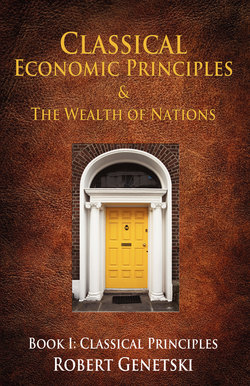Читать книгу Classical Economic Principles & the Wealth of Nations - Michael Ashley - Страница 7
На сайте Литреса книга снята с продажи.
Free markets make efficient use of resources
ОглавлениеWhen prices are free of artificial barriers and constraints, they tend to reflect the relative scarcity of resources. A high price signals a product or resource that is relatively scarce compared to its demand. The high price not only informs everyone that this item is valuable, it also signals precisely how valuable it is to each person.
How much we have to spend often reflects what we have been paid in exchange for our knowhow. We use that knowhow to produce things that others want. What we choose to buy depends on our financial resources and our preferences. Each of us is unique. Each of us has a different amount of money to spend. And each of us attaches a different value to the things we want.
The market system is the only system that enables each of us to know precisely how much of our knowhow (in the form of money) we will have to give up in exchange for the things we want. The price of anything we want captures this vital information about our individual choices. Our response in either buying or not buying certain things at certain prices feeds this information back to producers. They then respond to our choices.
We all adjust to prices. We do this without needing to know why the price is higher or lower. In fact, the beauty of the free market system is that it isn’t necessary to have all the information regarding what causes a high or low price or what causes it to change. The price itself contains all the information we need to make efficient choices.
At higher prices we have to exchange more of our money to get the item. Those with sufficient money and a great desire to have the item may pay the higher price. Others decide either to use less of the item or substitute something else. We adjust our purchases to reflect the value that each item has to us.
Lower prices indicate that the item is relatively plentiful compared to the demand. Armed with such information, each of us responds in a way that best fulfills our own unique preferences.
Similar decisions are made by producers. They use the price system to decide which products to make, which resources to use, whether to substitute machines for workers, or whether to use a foreign product or service instead of a domestic one. As with individuals, the price system provides producers with all the information they need to make the most efficient decisions in each of these areas.
Our labor is the key resource used to create goods and services. In a free market, hard-working, conscientious workers that contribute to creating more value tend to get paid more than lazy, less conscientious workers. This encourages workers to be more productive and discourages them from being less productive.
Rewarding wise decisions and productive behavior while penalizing poor decisions and unproductive behavior promotes efficiency. The resulting distribution of income tends to place more resources and responsibilities in the hands of those who are more responsible and more productive. At the same time, it tends to shift resources away from those whose behavior is less responsible and less productive.
The more individuals and prices are free to respond to market pressures, the greater will be the tendency for a nation to use its resources efficiently. A failure to appreciate the importance of free markets undermines the entire wealth-creating process.
